Top Free Websites for 1st Graders' Learning
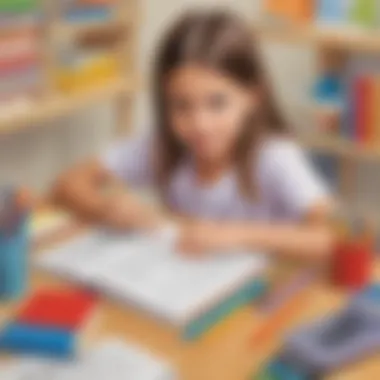

Intro
As children start their educational journey, finding suitable resources can be a challenge for parents and educators. The digital landscape offers a plethora of platforms designed for young learners, especially for 1st graders. This article focuses on free websites that aid in developing essential skills for children at this stage. Each section will delve into unique offerings, benefits, and features of these platforms, ensuring that the information is not only comprehensive but also practical.
Educational experiences should be both stimulating and effective. The websites curated in this guide prioritize creativity, interactivity, and engagement, fostering a solid foundation for lifelong learning. By categorizing various resources, we aim to equip you with insights that will enhance your approach to education for young children.
Creative Activities
Engaging in creative activities helps children develop fine motor skills and cognitive abilities.
Craft Ideas
Crafing is a fun way for 1st graders to express themselves. Websites such as Crayola and PBS Kids offer a range of craft ideas that are easy to follow. Children can engage in projects that make use of common supplies found at home. Ideas like simple paper crafts or nature-inspired projects are popular and encourage creativity.
Step-by-Step Guides
Each craft activity is typically accompanied by a list of materials needed and step-by-step instructions. These guides make it easy for both parents and children to understand the process. For example, creating a paper plate animal is a simple project available on several educational websites. These resources often include illustrations, which can further aid comprehension and retention of information.
Educational Value
The educational benefits of creative activities cannot be overstated. They stimulate critical thinking, enhance problem-solving skills, and encourage teamwork when children collaborate on projects. These experiences also promote discussions about shapes, colors, and other concepts, reinforcing what they learn in school settings.
Fun Quizzes
Quizzes can be an exciting way to assess knowledge while keeping children engaged.
Quiz Topics
ElemFun provides a variety of quiz topics suitable for 1st graders. Subjects range from math and science to vocabulary and history. The broad spectrum of topics ensures that there is something for every child's interest.
Question Types
The quizzes incorporate various question types, including multiple-choice, true/false, and fill-in-the-blank. This diversity helps maintain attention and stimulates different thinking processes. It is crucial for quizzes to be interactive and visually appealing, capturing the interest of young learners.
Knowledge Reinforcement
Completing quizzes not only assesses a child’s understanding but also reinforces learning. When children revisit topics through these quizzes, it encourages retention. This repeated exposure aids in building a stronger academic foundation, which is vital as they progress through their educational journey.
Fact-Based Articles
Children's access to accurate information is essential.
Topics
Websites like Britannica Kids or National Geographic Kids provide a wide array of topics. These include animals, space, and geography. The breadth allows children to explore areas that pique their curiosity, enabling them to learn about the world around them.
Engaging Content
The articles are written in a straightforward style that caters to young readers. Complex ideas are simplified into digestible segments. Visual aids, such as images and videos, often accompany the text, making the learning experience more dynamic.
Prologue to Online Learning Resources
In today’s digital age, online learning resources have become essential for young learners, especially for those in the first grade. Children at this age are beginning to explore new concepts while developing foundational skills. Accessing educational websites is important for enriching their learning experiences. These websites offer interactive and engaging tools that can captivate young minds, making education more fun and effective.
Importance of Online Learning for Young Learners
Online learning presents numerous advantages for 1st graders. First, it helps bridge gaps that may occur in traditional education settings. Not all classrooms have the same resources, and online platforms can provide additional support. Children can learn at their own pace, which is crucial at this stage. When material is too challenging, it may discourage them, while content that is too easy could lead to boredom.
Furthermore, many online resources are tailored for engagement. They often include colorful graphics, interactive games, and storytelling elements. These features can enhance motivation to learn. According to educational studies, when kids enjoy their learning process, they understand and retain information better. This active involvement can have profound effects on long-term educational outcomes.
Accessibility and Convenience of Online Platforms
Another significant aspect of online learning is its accessibility. Families today often have multiple responsibilities, which makes finding time for educational activities challenging. Online websites can be accessed anytime, which allows for flexible learning schedules. Children can explore resources after school, during weekends, or even on vacations, making learning a continuous journey.
Online platforms are often designed to be user-friendly. Many of these websites do not require advanced technology skills, making them suitable even for young users. Parents can guide their young ones through these websites, but many interfaces are intuitive enough for kids to navigate on their own. This independence can boost a child's confidence as they become more familiar with using technology for educational purposes.
"The best way to learn is to enjoy the process itself, and online platforms make this possible for young children."
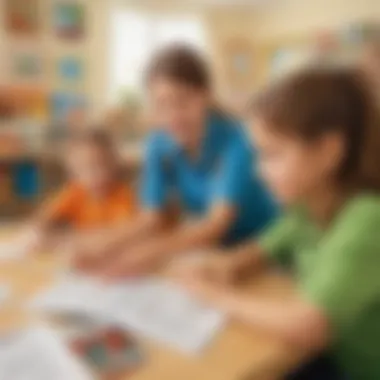
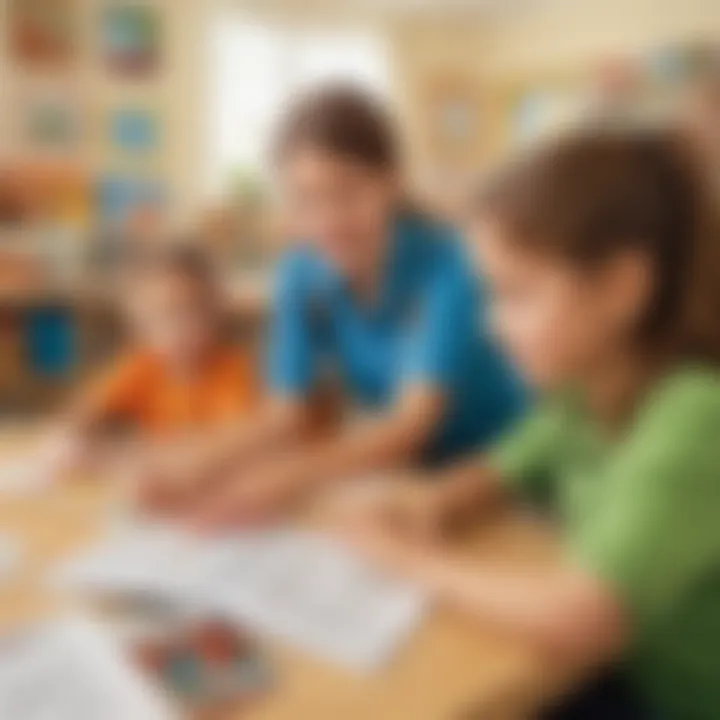
Criteria for Selecting Educational Websites
Selecting educational websites for 1st graders is a crucial task for parents and educators alike. It is important to ensure that the websites chosen are not only informative but also engaging for young learners. As children at this age are developing their attention spans and cognitive skills, finding the right resources can significantly influence their educational journey. By establishing clear criteria, one can create a more effective learning environment that complements traditional education.
Age Appropriateness and Engagement
Age appropriateness is one of the foundational criteria in selecting websites for young learners. Websites must cater to the developmental stages of 1st graders. Content should be simplified, both in language and concepts, making it easier for children to understand. Engaging elements, like colorful graphics and interactive features, can bolster interest. Websites like Starfall and ABCmouse provide age-relevant activities that keep children motivated.
An engaging website should also include a variety of formats, such as videos, games, and quizzes, to maintain a child’s attention. This variety allows students to experience learning through different mediums, which can aid in information retention. When children find the content appealing, they are more likely to return to these platforms, fostering a love for learning.
Educational Value and Learning Objectives
Another vital aspect is the educational value of the content. The selected websites should align with specific learning objectives set for 1st graders, which cover basic literacy, numeracy, and critical thinking skills. Websites should not only entertain but also educate. For instance, learning games that teach addition or subtraction should reinforce the skills being taught in the classroom.
Furthermore, it’s important to ensure that the resources are appropriate based on lesson plans and standards. Websites that provide materials in subjects like reading, math, and science should have clear educational goals. For example, Cool Math Games offers interactive exercises that align with math standards, thus reinforcing concepts in a fun manner.
User-Friendliness and Navigation
User-friendliness is essential when selecting educational websites. A website should have a simple interface that allows children to navigate easily. Complicated designs can frustrate young learners, causing loss of interest. Children should be able to access their desired content quickly without help from adults.
Clear categories, bold headings, and intuitive layout enhance the user experience. Consider websites that use icons or images to help children find their way around. Moreover, websites that offer guided tutorials or straightforward instructions help in building a child’s confidence as they learn independently.
In summary, selecting the right educational websites for 1st graders involves assessing age appropriateness, educational value, and user experience. Each of these criteria contributes to an enriching learning environment that can greatly benefit young learners.
Websites for Reading and Language Arts
Reading and language arts are essential pillars of a child's education. By accessing informative and engaging websites, 1st graders can develop critical literacy skills at a young age. Digital resources can make the learning process more interactive and enjoyable. This allows young learners to explore language in various contexts, enhancing their understanding and appreciation for reading.
Interactive Storytelling Platforms
Interactive storytelling platforms help young learners engage with stories. Websites such as Storyline Online present well-known books read by actors. This method captures the children's imagination and helps them visualize the stories better. By interacting with the characters and plots, 1st graders can discuss themes and messages. Children can learn the structure of stories, fostering a love for literature.
Phonics and Vocabulary Development Tools
Phonics and vocabulary development tools are crucial for building foundational skills. Sites like Starfall offer phonics-based games and activities that enhance letter recognition and sound blending. They provide fun methods to reinforce vocabulary. Through engaging exercises, kids learn new words within context, making it relevant and exciting. Continuous practice through these tools aids in better retention of language concepts.
Reading Comprehension Resources
Resources that focus on reading comprehension support young learners in grasping key ideas from texts. Websites such as Raz-Kids provide level-appropriate reading material and assessments. Children can read at their own pace, answering questions to ensure understanding. This process builds confidence in their reading abilities. Engaging with diverse texts expands children's knowledge of language, culture, and concepts in a direct way.
Websites for Mathematics Learning
Mathematics is a foundational skill essential for first graders. Engaging young learners through websites that make math fun can foster a love for numbers and problem-solving. This section focuses on the importance of diverse online resources that support mathematics learning. These platforms not only develop critical thinking skills but also prepare children for future academic challenges.
By using accessible online tools, parents and educators can create a stimulating environment for exploring math. Interactive websites keep students engaged through games and challenges, making learning enjoyable. Moreover, these resources can provide instant feedback, allowing children to understand their mistakes and learn effectively.
Interactive Math Games and Activities
Interactive math games are effective tools for engaging children. These games often incorporate colorful graphics and characters, capturing the attention of young minds. Websites such as ABCmouse and Coolmatkids offer engaging games that teach numbers, basic operations, and problem-solving in entertaining ways.
Games are designed to motivate students. They can practice counting, addition, and subtraction without the pressure of traditional methods. Many of these games also allow for progression, where children can advance to higher levels as they master skills. With rewards and achievements integrated into gameplay, children feel a sense of accomplishment, further enhancing their interest in math.
Problem-Solving and Critical Thinking Tools
Developing problem-solving abilities is crucial at this stage of learning. Online platforms like PBS Kids provide activities that challenge students to think critically about mathematical concepts. These tools often involve puzzles or scenarios requiring logical reasoning to find a solution.
By presenting math as a series of problems to be solved, children learn to approach challenges methodically. Sites often include visual aids and step-by-step guidance, making it easier for young learners to grasp concepts. Encouraging children to explain their thought processes not only enhances their understanding but also builds confidence in their abilities.
Math Skill-Building Exercises
Skill-building exercises are essential for reinforcing math concepts. Websites such as Khan Academy Kids or Math Playground offer structured practice sessions tailored to young learners. These exercises often adapt to the child’s skill level, ensuring that learning is personalized.
Through a variety of drills focusing on addition, subtraction, and early geometry, children can solidify their foundational math skills. Exercises can vary in format, including quizzes, matching games, and interactive worksheets. This variety helps maintain interest while ensuring that children receive comprehensive math practice.
"Interactive learning keeps children engaged and makes math concepts easier to understand."
In summary, websites for mathematics learning can provide invaluable resources for first graders. The combination of fun games, critical thinking tools, and skill-building exercises can develop a strong mathematical foundation. Parents and educators should explore these platforms to support young learners in their mathematical journey.
Websites for Science Exploration
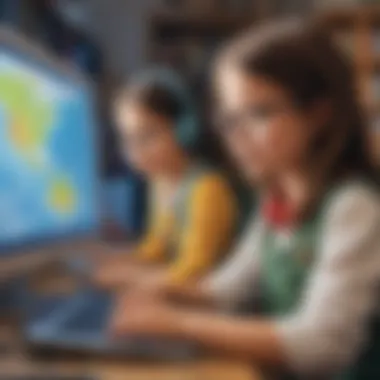
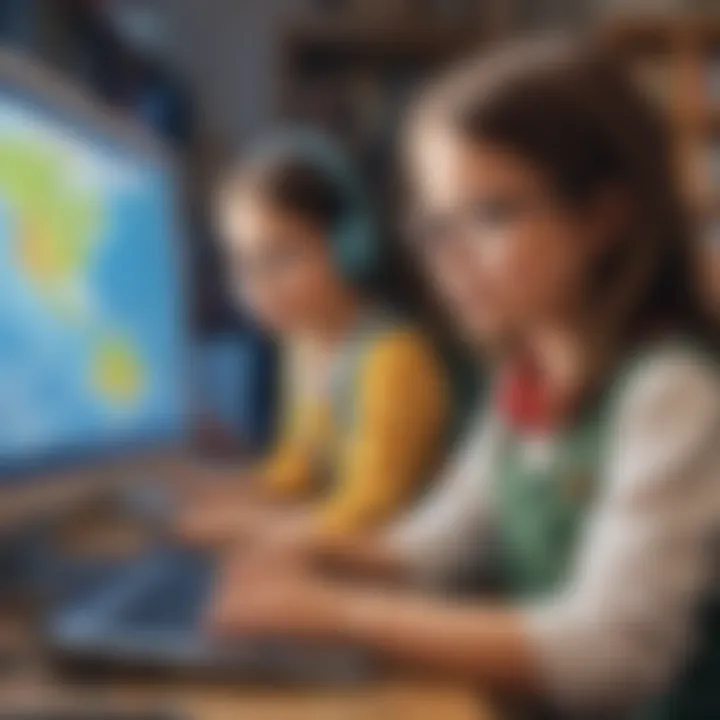
In the context of education, science exploration plays a vital role in sparking curiosity and fostering a sense of inquiry among young learners. Websites dedicated to science provide interactive and engaging platforms that encourage 1st graders to explore concepts related to the natural world, the physical realm, and the scientific method itself. By utilizing these online resources, children can develop critical thinking skills, gain hands-on experience, and cultivate a lifelong fascination with learning and science.
When selecting websites for science exploration, it is crucial to consider several factors. These include the clarity of the content, age appropriateness, and the ability to engage young minds in fantastic ways. The websites should be designed to make science accessible and enjoyable, allowing children to explore their interests within a safe digital environment.
Virtual Science Experiments and Simulations
Virtual science experiments and simulations offer an exciting avenue for first graders to engage with scientific concepts without the need for physical materials. These platforms allow young learners to conduct experiments in a controlled, virtual setting, making science experimentation possible even without access to a traditional classroom.
For example, websites like the Exploratorium provide interactive experiments that cover various scientific principles, including physics and biology. Students can virtually mix chemicals, observe reactions, and test hypotheses. This process not only reinforces theoretical concepts but also nurtures problem-solving skills.
Such experiences are crucial in enhancing understanding and retention of scientific knowledge. Children learn to ask questions, seek answers, and analyze outcomes.
Interactive Nature and Environment Resources
Interactive nature and environment resources serve as excellent tools to teach children about the world around them. These platforms often feature videos, quizzes, and engaging graphics that showcase different ecosystems, wildlife, and environmental issues.
Websites like National Geographic Kids offer a vast array of information about animals, habitats, and conservation. The engaging multimedia content captures children's attention and encourages them to explore topics they may never have considered before.
Understanding nature enhances children's appreciation of biodiversity while emphasizing the importance of environmental stewardship from a young age. Children can connect with real-world issues like climate change and habitat destruction in a way that resonates with their curiosity.
Fun Facts and Learning about the World
Websites that offer fun facts and information about the world also play a significant role in scientific exploration. They provide bite-sized pieces of information that can motivate children to learn more about different subjects.
For example, sites like BBC Bitesize offer entertaining and informative content that combines factual knowledge with interactive elements. Children can learn about everything from space to geology, all while being entertained and engaged.
This format allows kids to digest complex information in a simplified manner, making it less intimidating and more approachable. By presenting learning in a fun format, children are more likely to remember and connect with what they have learned.
"Engaging young learners with interactive content fosters curiosity and deepens the understanding of scientific concepts."
In summary, websites for science exploration deliver valuable educational experiences that nurture young minds. By using virtual experiments, exploring nature, and discovering fun facts, 1st graders can develop a strong foundation in scientific literacy that benefits them in later years.
Websites for Social Studies and History
Websites focusing on social studies and history play a critical role in a child's understanding of the world. At this young age, students begin to develop a sense of their place within society and learn about cultures, events, and figures that have shaped history. Engaging online resources can make these subjects more accessible and stimulating. Websites can offer interactive learning experiences that foster curiosity and encourage critical thinking.
Additionally, social studies support a child's development of citizenship skills. As they learn about different cultures and historical perspectives, they also acquire values such as respect and empathy. Utilizing online websites enriches this learning process by providing varied content that textbooks may not cover extensively.
Cultural Exploration and World Geography
This subsection centers around the importance of cultural exploration in online education. Websites dedicated to world geography can introduce first graders to diverse cultures, languages, and customs. By exploring the world digitally, children can visually and contextually engage with countries and communities far from their own.
These platforms often include features like virtual tours, interactive maps, and multimedia content that brings cultural narratives to life. Such resources can highlight essential questions about what constitutes a culture, how it evolves, and why understanding different cultures is important. Encouraging children to think about these issues develops their global awareness early on.
Historical Events and Figures for Young Learners
Understanding history begins with stories: stories of heroic figures, pivotal moments, and significant discoveries. Websites that focus on historical events and individuals offer engaging narratives tailored for young learners. These resources often present information through animated videos or child-friendly texts that make complex ideas comprehensible.
The importance of introducing children to history cannot be overstated. It helps them understand continuity, change, and cause-and-effect relationships in their surroundings. Exploring notable figures' contributions can also inspire them. Resources can include games and quizzes that reinforce learning while making it fun.
Interactive Timelines and Maps
Interactive timelines are powerful tools for teaching chronology and context. They allow young learners to visualize the sequence of historical events and recognize their significance. By clicking on events, students can access more detailed information. This method simplifies the complicated concept of time, helping children make connections between events and appreciate history as a narrative.
Maps, too, play a crucial role in history education. Interactive maps can show the geographical context of events, enhancing comprehension. Children can understand location, migration, and cultural exchanges through these tools. This method encourages spatial thinking and helps students grasp not just where events happened, but why those places were significant.
"Engaging resources help bridge gaps in traditional learning, making history tangible and memorable."
In summary, the online world offers a wealth of resources that support learning in social studies and history. By emphasizing cultural exploration, important historical figures, and engagement through interactive elements, children can develop a strong foundation in these subjects. This approach not only aids academic growth but also fosters a lifelong interest in understanding their world.
Creative Arts and Music Websites
Creative arts and music are fundamental areas in the educational development of young learners. They provide an outlet for self-expression and creativity, allowing first graders to explore their abilities and develop new skills. Engaging with creative arts fosters not only artistic talent but also critical cognitive capabilities, such as problem-solving and spatial reasoning. Furthermore, participation in music enhances listening skills, memory, and emotional development, making these websites essential resources in any educational framework for children.
Artistic Expression and Drawing Platforms
Artistic expression is crucial for first graders as it helps them communicate their ideas visually. Websites like Drawalong and Art for Kids Hub offer interactive drawing tutorials that guide children step-by-step in creating their own artwork. These platforms encourage creativity while providing a sense of achievement when a drawing is completed. Children can experiment with colors and techniques, building confidence in their artistic abilities.
Benefits of these platforms include:


- Skill Development: Children learn various drawing techniques, improving their fine motor skills.
- Creativity Boost: They can express themselves freely, developing their unique style.
- Engagement: Many platforms are designed to be fun and captivating, holding children's interest for longer periods.
Overall, artistic drawing platforms support both educational and personal growth for first graders.
Music Education and Interactive Sound Exploration
Music education is a vibrant component of early learning. Websites such as Music for Kids and LaLa Piano provide engaging ways for young learners to explore music. These sites often include interactive tools like virtual instruments, rhythm games, and singing activities. By utilizing these resources, children can understand basic music concepts, such as rhythm, melody, and harmony, in an enjoyable way.
Key features include:
- Interactive Learning: Children can play along with music, enabling a hands-on experience.
- Cognitive Development: Engaging with music aids in memory and concentration skills.
- Cultural Awareness: Children can learn about different musical styles and instruments from around the world.
Interactive music platforms cater not only to musical interests but also to overall cognitive growth, making them an indispensable part of early education.
Crafts and DIY Activities for Kids
Crafts and DIY activities encourage creativity and independence among first graders. Websites such as Kids Craft Room and Crayola offer a variety of projects that use everyday materials found at home. These activities not only enhance fine motor skills but also promote innovative thinking as children learn to transform simple items into creative projects.
Benefits of DIY and craft websites include:
- Hands-On Learning: These projects allow children to learn actively rather than passively.
- Fun and Rewarding: Completing a craft gives a sense of accomplishment and pride.
- Encouragement of Imagination: Children are inspired to come up with their own ideas for future projects.
In summary, craft and DIY websites provide a valuable resource for nurturing creativity and essential skills in young learners.
The Role of Parents and Educators
Parents and educators play a crucial role in the educational journey of 1st graders, especially in navigating online learning resources. Their involvement not only enhances the learning experience but also helps in fostering a supportive environment that encourages curiosity and growth. The resources highlighted in this guide are tools that can significantly enrich foundational skills in young learners. However, to maximize their effectiveness, it is vital for an adult to guide the process.
How to Integrate Online Learning into Daily Routines
Integrating online learning into daily routines can be achieved smoothly with some planning. First, establish a consistent schedule that allocates time for educational websites to lessen the chances of distraction. For instance, setting aside 30 minutes each day after school for reading or math activities online promotes structure. This leads to better habit formation and, ultimately, learning.
Moreover, make the learning interactive. Engage with the child by discussing what they learned and even participating in some activities together. This can include reading stories aloud from online platforms or working on math problems through games. The key is to make learning a shared experience, which can significantly enhance understanding and retention.
Monitoring Progress and Engagement
Monitoring the progress of young learners is essential. Parents and educators should regularly check the child’s interaction with the websites. This includes reviewing performance in quizzes, tracking completion of activities, and discussing topics explored on these platforms. Tools like progress charts can be visually helpful to show growth over time.
In addition, it's important to remain attuned to the child's engagement levels. Notice if they seem excited about certain activities or if they struggle with others. This insight allows for timely adjustments to the chosen resources, ensuring that the online learning experience remains relevant and enjoyable.
Balancing Screen Time with Traditional Learning Methods
Striking a balance between screen time and traditional learning methods is crucial. Although educational websites provide valuable learning opportunities, it's essential to incorporate physical books, hands-on activities, and off-screen play. This balance prevents overreliance on screens and fosters more holistic development.
In practice, establish 'tech-free' times where reading books or engaging in crafts comes into play. Encourage activities away from screens, such as visiting a local library or nature exploration, to complement what is learned online. By ensuring a mix of both traditional and digital learning, children can develop critical thinking, social skills, and a love for learning in multiple forms.
Engaging with both online and offline resources creates a rich learning tapestry for children.
By emphasizing the roles of parents and educators, the journey into online learning for 1st graders becomes a collaborative and enriching experience. It empowers kids not only to learn but to thrive.
Culmination and Future of Online Learning for Young Learners
The section titled "Conclusion and Future of Online Learning for Young Learners" plays a vital role in summing up the essential insights from the article. It encapsulates how online learning resources can effectively boost educational experiences for first graders. The focus here is not only on wrapping up the information presented but also on projecting the significance of integrating these resources in the future.
Online learning presents an innovative approach to education. For young learners, it provides a diverse range of interactive mediums which can enhance understanding and retention of knowledge. Websites curated for this age group are designed to be engaging, catering to various learning styles. Thus, it is important for both parents and educators to remember these resources when planning educational activities.
Effective online learning is about accessibility. With the right websites, children can access materials that complement traditional learning. It brings education to their fingertips, allowing learners to explore subjects that spark joy and curiosity. This aspect makes online resources indispensable. Furthermore, educators and parents should consider evaluating new platforms as technologies evolve. Keeping an eye on digital trends ensures we provide children with the best learning opportunities.
"Online resources are an extension of the classroom, offering limitless possibilities for exploration and knowledge."
In summary, securing a foundation for young learners is critical. Online educational websites are instrumental in achieving this goal, presenting an array of methods to observe and engage in various subjects. As we approach the future, continued advancements in educational technology will create new avenues for interactive and meaningful learning experiences.
Recap of Key Resources Reviewed
In this guide, we have reviewed several essential resources designed for first graders. The evaluation process included identifying websites covering various subjects such as reading, mathematics, science, social studies, creative arts, and music. Each platform serves a unique purpose in helping young learners develop essential skills. Key resources include:
- Starfall: Focuses on reading and phonics.
- ABCmouse: Offers comprehensive courses across different subjects.
- Khan Academy Kids: Provides a range of interactive exercises in math and reading.
- National Geographic Kids: Engages learners with science and nature.
- PBS Kids: Features educational games and videos based on popular shows.
These resources, alongside many others discussed in the article, play an essential role in supporting the educational journey of young children.
Trends in Educational Technology for Young Children
The realm of educational technology continues to evolve rapidly. Staying informed about new trends is essential for tailoring learning experiences effectively. As we look ahead, several trends are worth noting:
- Personalized Learning: Technology enables customization of learning experiences to fit the needs of individual children. Educational platforms can adapt based on performance and preferences.
- Gamification: Incorporating game-like elements in learning creates motivation and engagement. Children are more likely to participate actively when the learning process feels enjoyable.
- Mobile Learning: The proliferation of smartphones and tablets offers more opportunities for children to learn on the go. Learning resources are now more accessible than ever.
- Collaborative Learning: Many educational websites promote social interaction among learners. Group activities in virtual environments can foster teamwork and communication skills.
- Multilingual Learning: With globalization, various platforms now offer content in multiple languages. This supports a diverse learning environment and benefits children from varied linguistic backgrounds.







